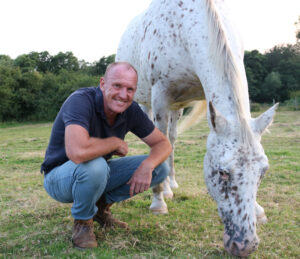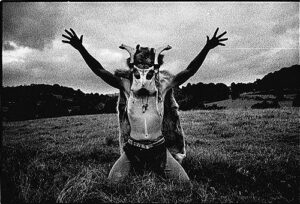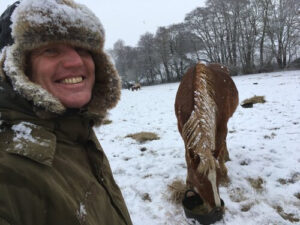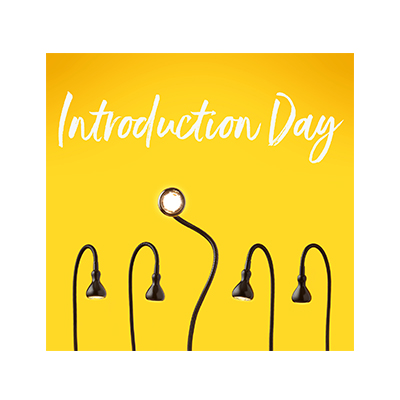 Growing up along Sydney’s northern beaches, I enjoyed a typical Australian childhood, playing in the bush and swimming in the sea. My conservative middle-class parents were defined by the values of post-war white Australia: cricket, rugby and the love of Queen and country. It was a simple life, the path to happiness neatly written out for me to follow – as long as I wasn’t prone to questioning anything.
Growing up along Sydney’s northern beaches, I enjoyed a typical Australian childhood, playing in the bush and swimming in the sea. My conservative middle-class parents were defined by the values of post-war white Australia: cricket, rugby and the love of Queen and country. It was a simple life, the path to happiness neatly written out for me to follow – as long as I wasn’t prone to questioning anything.
I was the last baby; my brother and sister were some years older than me. I was a sensitive little fella, not so confident with others, a romantic who was deeply interested in ancient history, landscape and nature. The rocks and trees of my childhood danced around me in an internal world of inspiration and safety. All this stopped at age 5, the day I went to school.
Separation from my mother and the peace of home came as a devastating shock. Thrust into a world of social dynamics that I just couldn’t comprehend, I found the children cruel, the teachers aloof, and the rules undefined. The world I’d known had ceased to exist. My parents, not being able to understand or deal with my internal distress, carried on as normal, ignoring the signs of my increasing panic.
In the fullness of time, all of us were shipped off from our local primary school to further education, far from the trust and safety that my parents once represented. I was now filled with an overriding sense of dread. To this very day, I wake up some nights in a cold sweat, dreaming that I have to go to school.
Overwhelm gripped me early in life – a desire to fit in was combined with a desperation to get away. Consumed by shame and a growing belief that I was defective all contributed to a limited academic education. Dyslexia developed exponentially from there. By fifteen I‘d given up and resigned myself to failure. The one thing I was determined to do was to escape.
Now a young man, my emotional landscape was fuelled by testosterone – deep sadness, shame and vulnerability were submerged in a river of anger. At nineteen, my world was defined by violent relationships, alcohol and increasingly elaborate methods of self-harm. Looking back now, it’s a complete mystery to me why I didn’t end up dead or in prison.
The Great Escape
At twenty one, with little money, I took the opportunity for adventure and went abroad for the first time to Indonesia. I was on my own, but loneliness was never an issue as despair was my constant companion. What I found in Indonesia was nothing short of an epiphany. The culture, the surroundings, the religion and social expectations were all completely different. Within two weeks I’d melted into the landscape, travelling the length of the countless islands, immersing myself in the shifting culture. For the first time since I was a child, I’d found a sense of self that inspired me – a freedom to be defined by myself.
My arrival back in Sydney many months later had a visceral impact. I felt if I re-entered my previous life, it would destroy me. Choosing to leave wasn’t a decision as such, more of a reflex reaction. A month later I bought an old car, packed what belongings I had and drove north up the east coast of Australia. I knew I had to leave completely and that meant burning all bridges to family and friends. I was finally going to escape, disappear into the landscape, never to be seen again. I took with me three books; Jonathan Livingstone Seagull, Joseph Campbell’s The Hero With a Thousand Faces and Frazer’s The Golden Bough.
My car broke down 1,000 miles north of Sydney, where I lived on the beach for a few months, finally walking into the rainforest, which became my home for the next 10 years. My sole desire was to immerse myself in deep nature, read and paint what I discovered.
 The Rainforest Years
The Rainforest Years
My rainforest years were beautiful. I built a small cabin, grew my own food and at night I’d walk down to the river and float downstream, the moon flickering between the shadows, my cat padding alongside the riverbank keeping track of my movements. His eyes were always transfixed by the candles I’d made from forest snail shells dipped in wax that I relied upon to guide me as I travelled into the darkness. During the day, walking up the rainforest creek beds naked, I’d camouflage myself in mud, spearing jungle perch for my dinner. They were idyllic times.
Painting was a passion; it defined my sense of self, which expanded constantly, I found wearing masks to re-enact archetypes enabled me to speak to a larger audience. Sometimes I’d wear a mask made from a cow’s pelvis, my body painted black and white and my hair plaited with feathers. I found a voice I didn’t realise I had. It spoke of a change in social consciousness, personal empowerment and the wisdom of deep nature.
My work gained a certain notoriety. National newspapers and documentary film-makers followed. My paintings sold, so I had money for the first time. I travelled the world and, challenging my dyslexia, obtained a degree in Archaeology. On the surface I seemed successful, yet in my relationships my old demons haunted me.
To love and be loved I needed to be vulnerable, yet vulnerability was a minefield. Increasing sensitivity meant that small triggers set off a chain of emotional reactions that would time and again bring me back to heartbreak, failure and despair.
A Whirlwind Romance
In 2000, I was swept up in another whirlwind romance that took me to England. I married into a wealthy family and desperately wanted to make things work. The relationship quickly became mired in frustration, confusion and increasingly frequent bouts of anger and rage, fuelled by a deep need to be heard and understood.
I just couldn’t understand why yet another relationship was falling apart. My wife was a very intelligent woman and we were both caught up in something of our own making, but she had an emotional understanding that was out of my reach. She suggested I do the Hoffman Process, so a few weeks later, in 2001, I arrived at Florence House in Sussex, where the course was held.
It rapidly became apparent that I needed to totally commit to the Process and the group – it wasn’t going to be an easy ride. What I didn’t realise was just how far back I’d have to go into my past and how convoluted my emotional drivers were. The Process opened me out in a way I’d never seen myself before. By the end of the course I was elated and empowered with this new understanding of myself.
Yet fear gripped me still. How would I cope when the old dynamics occurred? Would those emotional blueprints still trigger the patterns I’d now identified? I felt the return home to my wife was not going to be easy. I had the knowledge gleaned from my Process, but that was just the beginning. Now I needed to travel the path. As I later came to realise, knowledge by itself is just awareness – it’s in living life with that awareness that one gains wisdom.
Over the next few months, life changed. I began a new journey that took me to some dark and difficult places. Relationships clarified and reformed. I flexed my muscle of emotional intelligence until it filled my whole body. 9 months later I got divorced. It wasn’t easy, but my wife and I managed to communicate in a new way that has allowed us to remain friends to this day.
For a while I worked with famous artists and tried to develop a niche for myself as an artist in the UK but it was never as powerful or as authentic as my time in the rainforest. Finally, in 2007, I began working as an archaeologist and never picked up a paintbrush again.
In the meantime I’d also begun to participate in Family Constellations – a way to investigate your family system, sometimes going back many generations. Like the archetype work in the rainforest, this allowed me to explore different parts of myself and see things through a different lens. It provided powerful experiences, which allowed me to inhabit specific emotional landscapes and learn from them objectively.
The Beautiful Horse Whisperer
 In 2010 I met a beautiful girl called Emma who was tending her horses in the field next to my house. She began talking to me about the relationship she was developing with her horses. She didn’t want to ride them anymore, she just wanted to acknowledge them as individuals and form a deeper relationship with them. To do this she needed to understand how they saw the world and how they communicated. She discovered that their place of communication was the present moment. This state of presence can be accessed by focussing on our senses – a place beyond emotional drivers and thoughts.
In 2010 I met a beautiful girl called Emma who was tending her horses in the field next to my house. She began talking to me about the relationship she was developing with her horses. She didn’t want to ride them anymore, she just wanted to acknowledge them as individuals and form a deeper relationship with them. To do this she needed to understand how they saw the world and how they communicated. She discovered that their place of communication was the present moment. This state of presence can be accessed by focussing on our senses – a place beyond emotional drivers and thoughts.
Presence is totally authentic and can only be fully experienced by being absolutely vulnerable, without expectations and without judgement. Animals live in this place continually, constantly reassessing their environment, aligning themselves to authenticity in order to make decisions, such as ‘do I run’ or ‘am I safe’?
It was being in the present moment that allowed me to find serenity in vulnerability. Presence takes me into a field that exists between right and wrong, of confusion and clarity, of pain and happiness, of acknowledgement and being acknowledged. That experience finally allowed me to find deep compassion, love and forgiveness for myself. Working this way with the horses had brought me full circle back to Florence House and what the Process had begun.
Emma and I married in 2013. Five years later my father died, so we I travelled to Australia for the funeral. Although this stirred up deep emotions, I felt free of any anxiety around my family for the first time. I just felt love. I think I could finally see them for who they are and not what they represented.
For me, vulnerability proved to be the path to authenticity. The Hoffman Process was the door to understanding my emotional blueprint, Family Constellations allowed me to travel through this emotional landscape safely, giving me a deeper understanding of the human experience. Working with the horses and understanding the importance of accessing the present moment completed the healing of my childhood trauma that had for so long defined my life.
SInce I wrote this, Emma and have had our first child and the start of another great adventure.
I highly recommend the Hoffman Process to anyone. The support is ongoing and to this day I hold the people I worked with during my time at Florence House dear to my heart. We travelled deeply and held each other through it all and for that I’ll be forever grateful.
For more about our Cameron and Emma’s equine retreats, 1-to-1 sessions and constellation groups with horses, visit www.intuitivehorse.com






 Sign up to receive monthly newsletters from Hoffman
Sign up to receive monthly newsletters from Hoffman